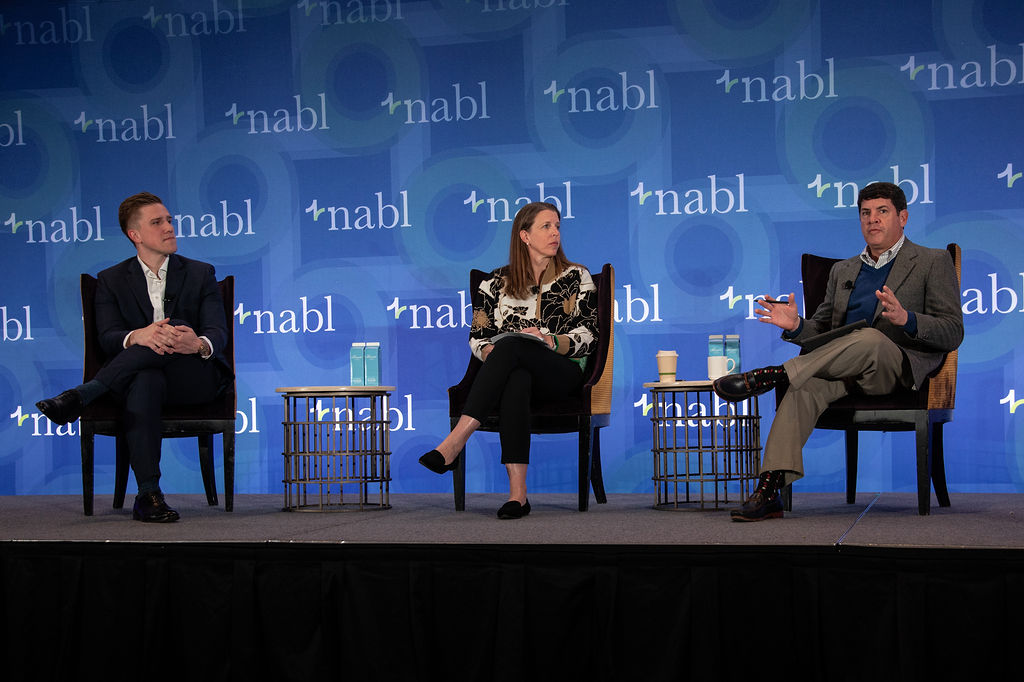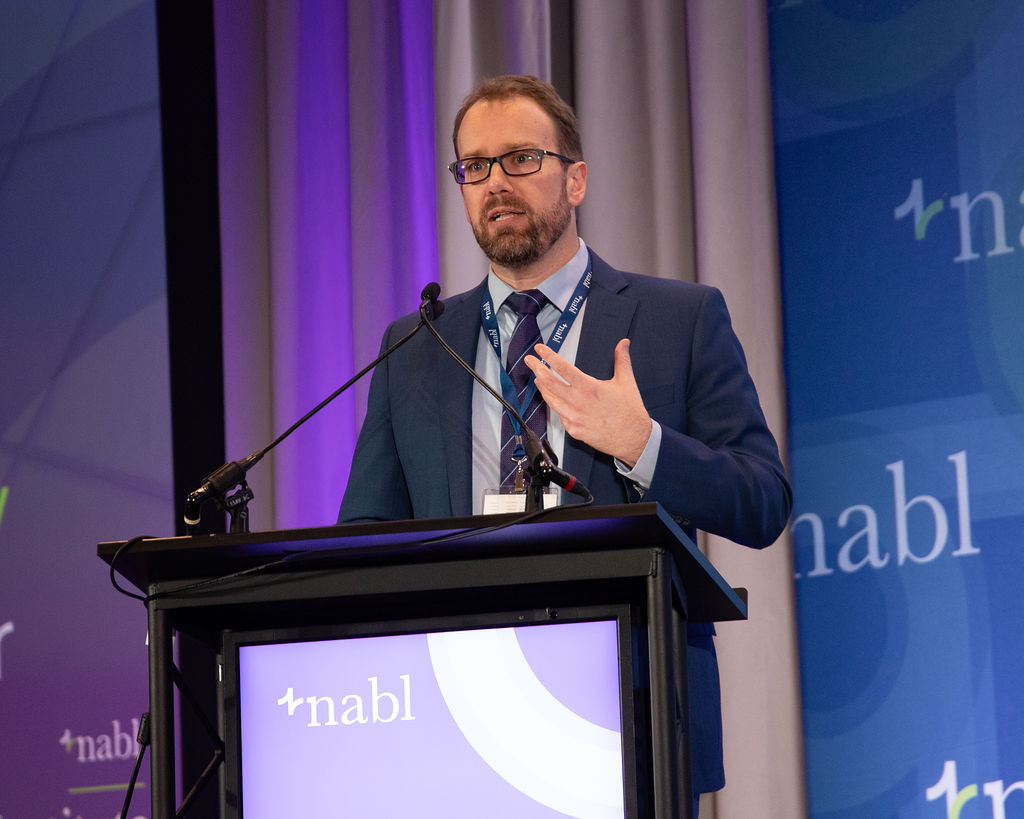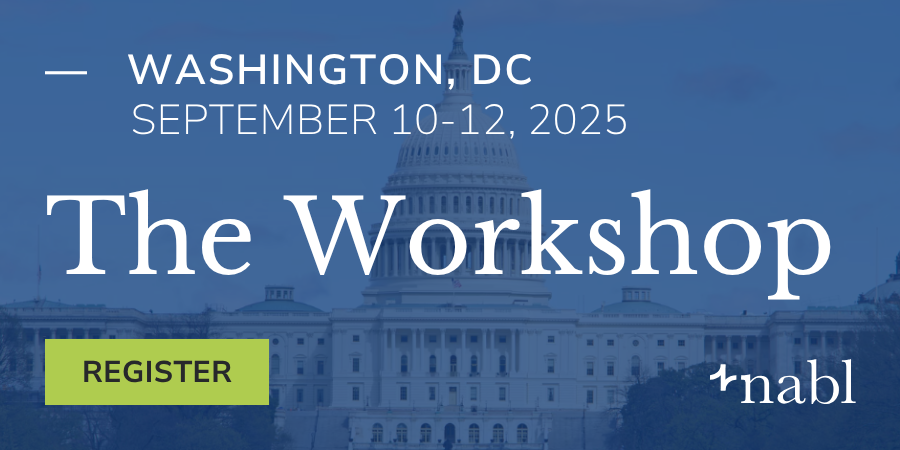- News
Six Takeaways from the Institute 2024
New format, new topics, new Institute. Here’s a recap from this year’s conference and what you may have missed.

By: Brian Egan, NABL
More than 200 NABL members convened in Chicago this week for the Institute 2024. We covered a lot of ground on topics ranging from affordable housing finance to Blue Sky Laws. Here are a few highlights you may have missed.
We Shook Up the Format
The breakout sessions at this year’s conference consisted of small discussion forums instead of the traditional lecture style sessions of past Institutes. Attendance at each breakout session was capped at 50, which permitted members to sit around table and learn from all their peers― rather than a dais of panelists.
“The new small group discussion forums provided an environment where we could learn directly from our peers and engage in a level of frank dialogue that is sometimes difficult in traditional larger conference setting.”
— Juliet H. Huang | Chapman and Cutler LLP | Chicago, IL
—— BY THE NUMBERS ——
213
Attendees
18
Discussion Forum Topics
Countless
Peer-to-Peer Exchanges
AI is Here
We kicked off the conference with a General Session on the topic that has dominated our conversations, both personal and professional, for the past year― the increasing role of artificial intelligence (AI) in our lives and practice. As a term, AI is encompassing. In the broadest sense, it’s safe to say you’re already using it (think autofill, spellcheck, and a browser ad for the latest water bottle that Amazon somehow already knows you want).
Our panelists narrowed their scope to the role that generative AI will play, and in some cases already plays, in the practice of bond law. Panelists generally agreed that AI isn’t about replacing work; it’s about enhancing it. And while the emerging technology has its fair share of faults and shortcomings, everyone acknowledged that it has massive potential to free professionals from a wide array of administrative tasks and optimize lawyers to perform, as one panelist put it, at the top of their license. “We don’t have to boil the ocean here,” stated Kate Orr of Orrick, Herrington & Sutcliffe LLP, “you don’t need AI to handle the most complex of tasks with 100 percent accuracy for it to be a benefit to your life.”
ESG Back in Focus
New state restrictions, a final corporate climate disclosure rule, investors shifting on labeled fund strategies, and more headlines. Environmental, Social, and Governance (ESG) factors in the municipal market have returned to the spotlight. Our forum on ESG and the Muni Market sparked lively conversation about latest trends and what it all means for market participants. Attendees quickly broke the massive topic into conversation centered on three buckets: 1) disclosure of material ESG risks, 2) labeling bonds, and 3) state procurement and contracting restrictions. During its Thursday morning meeting, the Securities Law and Disclosure Committee (SLDC) also discussed what, if any, implications the SEC’s new corporate climate disclosure rule could have for the municipal market.
Weighing the Promises and Pitfalls of FDTA
The Financial Data Transparency Act (FDTA) was a big discussion item throughout the conference, both in hallway sidebars and during our forum discussion on the topic. Programming covered the known knowns and acknowledged the many unknowns. Attendees asked who benefits from the law, what’s the cost benefit ratio, how could it introduce new antifraud concerns, and how should bond counsel help their clients navigate its impacts. Everyone agreed on one thing, however, NABL members will likely play a big role in its implementation over the next several years.
Discussing Where Bond Lawyers Fit into Elective Pay
Elective pay tax credits enacted by the Inflation Reduction Act (IRA) offer the promise of revolutionizing clean energy investment by states, local governments, and nonprofits. Still, a number of questions remain. Attendees at our session dedicated to the topic opined that the mechanics of these elective pay credits harken back to Build America Bonds (BAB) refund payments, but on a new level, and with many new dynamics and participants involved.
The credits may force bond counsel to take a broader look at the activities of their issuer clients― who’s advising them on these issues, what tax year have they selected, who’s making the calculations for these credits, which parties face liabilities and when? As one participant explained, it’s a big new area with a lot of excitement and people jumping in, but there’s a lot of need for translation between the bond lawyers who are well known by the issuers, the tax experts who understand the clean energy credit rules, and the engineers who understand the technical terms.
Gearing Up for a Potential Tax Bill in 2025
A report published last week by the American Enterprise Institute (AEI) calling for a federal tax to be applied to all municipal bonds foreshadowed a reality for municipal market participants― Congress and the Administration will most likely need to address expiring provisions of the Tax Cuts and Jobs Act (TCJA) in 2025. While the tax exemption for qualified municipal bonds enjoys broad bipartisan support in Washington, it remains an attractive pay-for for other partisan priorities. Attendees throughout the conference debated this reality and underscored the need to continuously remind federal decision-makers on the importance of municipal bonds and what they mean to constituents in their districts. As always, NABL will continue to keep members informed as updates become available.



